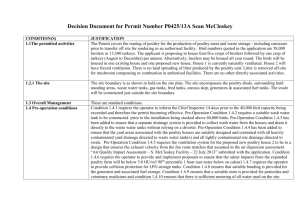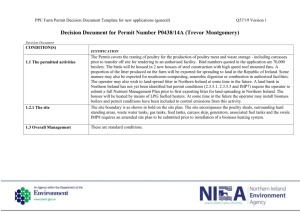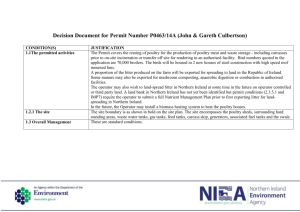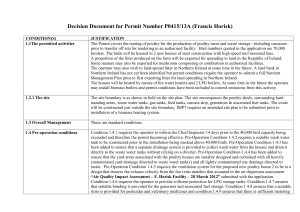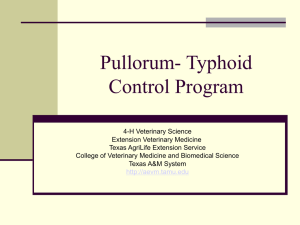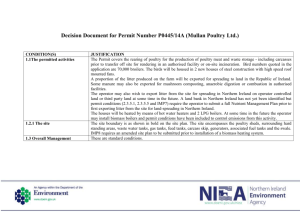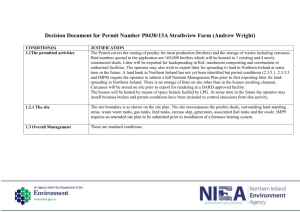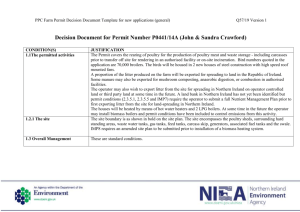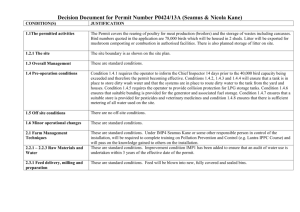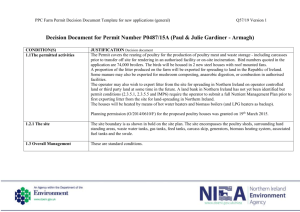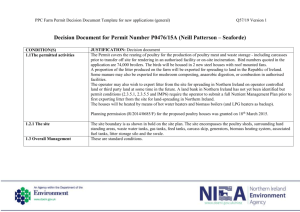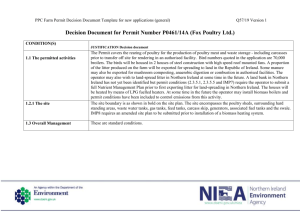P0428/13A
advertisement
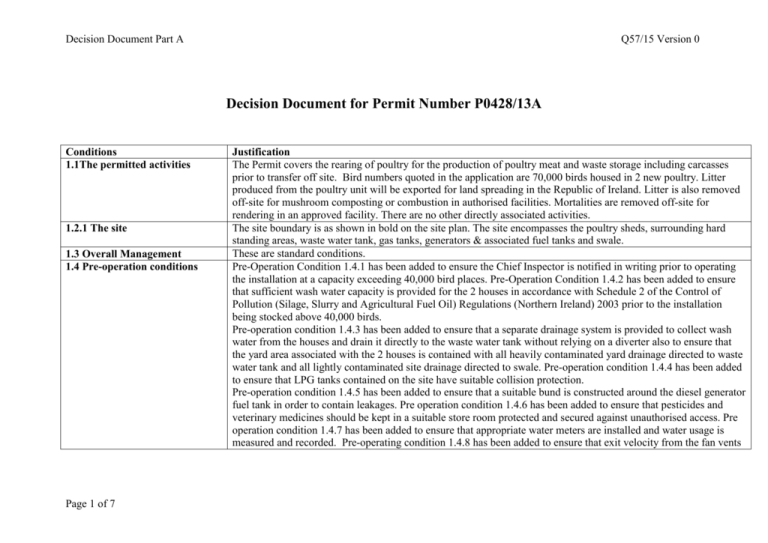
Decision Document Part A Q57/15 Version 0 Decision Document for Permit Number P0428/13A Conditions 1.1The permitted activities 1.2.1 The site 1.3 Overall Management 1.4 Pre-operation conditions Page 1 of 7 Justification The Permit covers the rearing of poultry for the production of poultry meat and waste storage including carcasses prior to transfer off site. Bird numbers quoted in the application are 70,000 birds housed in 2 new poultry. Litter produced from the poultry unit will be exported for land spreading in the Republic of Ireland. Litter is also removed off-site for mushroom composting or combustion in authorised facilities. Mortalities are removed off-site for rendering in an approved facility. There are no other directly associated activities. The site boundary is as shown in bold on the site plan. The site encompasses the poultry sheds, surrounding hard standing areas, waste water tank, gas tanks, generators & associated fuel tanks and swale. These are standard conditions. Pre-Operation Condition 1.4.1 has been added to ensure the Chief Inspector is notified in writing prior to operating the installation at a capacity exceeding 40,000 bird places. Pre-Operation Condition 1.4.2 has been added to ensure that sufficient wash water capacity is provided for the 2 houses in accordance with Schedule 2 of the Control of Pollution (Silage, Slurry and Agricultural Fuel Oil) Regulations (Northern Ireland) 2003 prior to the installation being stocked above 40,000 birds. Pre-operation condition 1.4.3 has been added to ensure that a separate drainage system is provided to collect wash water from the houses and drain it directly to the waste water tank without relying on a diverter also to ensure that the yard area associated with the 2 houses is contained with all heavily contaminated yard drainage directed to waste water tank and all lightly contaminated site drainage directed to swale. Pre-operation condition 1.4.4 has been added to ensure that LPG tanks contained on the site have suitable collision protection. Pre-operation condition 1.4.5 has been added to ensure that a suitable bund is constructed around the diesel generator fuel tank in order to contain leakages. Pre operation condition 1.4.6 has been added to ensure that pesticides and veterinary medicines should be kept in a suitable store room protected and secured against unauthorised access. Pre operation condition 1.4.7 has been added to ensure that appropriate water meters are installed and water usage is measured and recorded. Pre-operating condition 1.4.8 has been added to ensure that exit velocity from the fan vents Decision Document Part A 1.5 Off site conditions 1.6 Minor operational changes Q57/15 Version 0 matches that assumed in the air dispersion assessment “SKM Enviros R Newell facility draft report 5th April 2013”. There are no off-site conditions. These are standard conditions. 2.1 Farm Management Techniques These are standard conditions. IMP 5 has been added to ensure appropriate IPPC training is completed within 12 months of the effective date of the permit or as soon as a course becomes available. Richard Newell or another person in control of the installation will be required to complete training and will pass on the knowledge gained to others on the installation. 2.2.1 – 2.2.3 Raw Materials and Water These are standard conditions. Pre-Operation Condition 1.4.7 requires water meters to be installed to enable water usage of specific activities to be monitored prior to the site exceeding 40,000 birds. IMP1 has been added to ensure that an audit of water use is undertaken within 3 years of the effective date of the permit. These are standard conditions. Feed is blown into covered and sealed bins. 2.3.1 Feed delivery, milling and preparation 2.3.2 Storage of agricultural fuel oils and other materials 2.3.3 Minimising emissions from housing Page 2 of 7 These are standard conditions. At present there is one (approx. 200 litre capacity) diesel fuel tank associated with a generator which supplies power to all the poultry houses as well as other domestic & non-poultry-related uses. The tank is plastic in construction and is fully bunded. Pre operation condition 1.4.6 has been added to ensure chemicals and veterinary medicines are adequately contained in a sealed pesticide store room. Pre operation condition 1.4.4 requires that the LPG fuel tanks contained on site should be provided with suitable collision protection. Pre operation condition 1.4.5 requires that a suitable bund should be constructed around the diesel generator fuel tank and additionally if this fuel tank is greater than 1250 litres this should meet the requirements of schedule 3 of the control of pollution (agricultural fuel oil) regulations Northern Ireland 2003. Wash water is currently collected from the two existing poultry houses into a 144m3 tank which is located at the north end of the site. Pre-Operation Condition 1.4.2 has been added to ensure that sufficient wash water capacity is provided for the new poultry houses in accordance with Schedule 2 of the Control of Pollution (Silage, Slurry and Agricultural Fuel Oil) Regulations (Northern Ireland) 2003 prior to the installation being stocked above 40,000 birds. Pre-operation condition 1.4.3 has been added to ensure that a separate drainage system is provided to collect wash water from the houses and drain it directly to the waste water tank without relying on a diverter also to ensure that the yard area associated with the 2 houses is contained with all heavily contaminated yard drainage directed to Decision Document Part A 2.3.4 Litter storage 2.3.5 Litter utilisation Q57/15 Version 0 waste water tank and all lightly contaminated site drainage directed to swale. Pre-operation condition 1.4.8 has been added to ensure that the ventilation system for the existing poultry houses and the proposed new poultry house is to a design that ensures the exhaust velocity from the fan vents matches that assumed in the air dispersion assessment “SKM Enviros R Newell facility draft report 5th April 2013” submitted with the application. Litter is loaded directly from poultry sheds onto covered trailers and removed from site for land spreading in the ROI, mushroom composting or for combustion in an authorised facility. The operator estimates that approximately 590 tonnes of litter at a range of 65% to 70% dry matter will be produced on the site per year. Litter will be exported from site for land spreading in the ROI; information has been submitted from the receiving farm in the ROI demonstrating that the outlet has sufficient capacity to utilise the litter. Litter may also be exported from the farm for mushroom compositing or combustion in authorised facilities. No litter shall be spread to land on the farm. 2.4 Discharges to Groundwater No list I or II substances will be applied to land. 2.3.6 Odour These are standard conditions. The closest third party dwellings are approx. 140m North and 140m South of the proposed new poultry house and this is also approximately 150m from the second poultry house. Results of the independent air dispersion assessment “Enviros R Newell Facility draft report 5th April 2013” submitted with the application indicate that the current odour guideline level ie. (3.0 OU/m3 as set out in the Environment agency H4 odour management guidance, March 2011) is not expected to be exceeded at any of the closest existing 3rd party dwellings. The in-house Air Dispersion Check Modelling carried out by IPRI also shows that odour guideline levels are not likely to be exceeded at any of the third party nearest receptors. Pre-operation condition 1.4.8 has been added to ensure that the ventilation system for the poultry houses is to a design that ensures the exhaust velocity from the fan vents matches that assumed in the air dispersion assessment “Enviros R Newell Facility draft report 5th April 2013” submitted with the application. Due to the proximity of 3rd party dwellings, it is important that the operator follows measures to minimise odour, particularly at times such as crop clear-out. Measures described in the odour management plan provided with the application should be implemented. There is no history of odour complaints associated with the site. A satisfactory complaints procedure was submitted Page 3 of 7 Decision Document Part A 2.5 Waste minimisation 2.5.2 Disposal of carcasses 2.6 Energy Use 2.7 Accident Prevention and Management 2.8 Noise and vibration Q57/15 Version 0 with the odour management plan. No specific concerns were raised in any of the consultation responses received. People should not be unduly affected by odour emissions from the poultry unit provided the conditions set out in the permit are strictly adhered to. Due to the distances involved, the type of ventilation (high speed roof ridge fans) being used and the size of the site, odour impacts from the site are not considered likely to be significant. These are standard conditions. IMP2 has been added to ensure a waste minimisation audit is undertaken within 3 years of the effective date of the permit. These are standard conditions. Carcasses are disposed of to an approved rendering plant. A number of features have been incorporated into the design of the poultry houses to reduce the energy consumption e.g. High levels of insulation in the walls and roofs. IMP 3 has been added to produce an energy audit detailing energy consumption and measures to improve energy consumption on site, within three years from effective date of the permit. These are standard conditions. The plan provided with the application was satisfactory. These are standard conditions. A satisfactory noise management plan including complaints procedure was provided with the application. There is no history of noise complaints associated with this site and no noise concerns were raised in any of the consultation responses received. The closest third party dwellings are approx. 140m North and 140m South of the proposed new poultry houses this is also approximately 150m from the second existing poultry house. These distances are from the closest point of the nearest poultry house i.e. the front and back of the new poultry houses. Permit condition 2.8.2 requires deliveries of feed, apart from emergencies, to be restricted to between the hours of 0700 and 2200 Monday to Saturday, or as otherwise agreed in writing with the Chief Inspector. Significant noise impacts are not considered likely from this installation at these distances provided permit conditions are adhered to. 2.9.1 Recording These are standard conditions stating the requirements for recording and monitoring. Condition 2.9.1.7 reinforces the need to record the position of diverter valves that were required under pre-operating condition 1.4.3. 2.9.2 Emissions and Monitoring No specific controls are required on either emissions to air or water. 2.10 Decommissioning These are standard conditions. A satisfactory site closure plan was submitted with the application. Page 4 of 7 Decision Document Part A Q57/15 Version 0 IMPROVEMENT PROGRAMME IMP1 has been added to ensure a water audit is carried out within 3 years of the effective date of the permit. IMP2 has been added to ensure a waste minimisation audit is carried out within 3 years of the effective date of the permit. IMP3 has been added to ensure an energy audit is carried out within 3 years of the effective date of the permit. IMP4 has been added to emphasise the importance of swale(s) construction which can accommodate lightly contaminated site drainage. IMP5 has been added to ensure appropriate IPPC and accident management plan training is completed within 12 months of the permit being issued. IMP 6 has been added to ensure a review is carried out of the site drainage arrangements on the site within 6 months of the permit being issued. CONSULTEE COMMENTS The Public Health Agency Comments and measures in permit where applicable The Public health Agency principal concerns were emissions to air and land (ammonia, dust, odours) and the possibility of noise. They stated that if the applicant carried out all mitigation measures during construction and operation of the existing and new poultry house then the public health would be minimal and the public health agency would have no immediate concerns regarding adverse health effects of the facility related to IPPC issues. No additional conditions are considered necessary. District Council Concerns were raised by Banbridge District Council regarding the distance from the proposed site and the closest receptors. Banbridge District Council stipulated that the distances between the receptors reported in the “Enviros R Newell Facility draft report 5th April 2013” were incorrectly measured. Report shows odour impacts were acceptable with current odour guideline levels i.e. (3.0 OU/m3 as set out in the Environment agency H4 odour management guidance, March 2011) One of the receptors measured at 200m in the report was reported to be at a distance of 140m. Further check modelling carried out by IPRI showed that the proposed site had no likely significant environmental effects on the receptor at a distance of 140m.There is no history of complaints associated with the poultry unit. No further conditions are considered necessary. The FSA states that a well managed poultry production facility should present a very low risk of compromising the safety of the food chain and concludes that provided the operator complies with relevant technical guidance it is unlikely there will be any unacceptable effects on the human food chain as a result of the operations at the facility. Food Standards Agency NIEAConservation, Designations and Protection IMPACTS ON THE Page 5 of 7 Not applicable – there are no European sites within 10km and no ASSI’s within 2km of the poultry farm. Decision Document Part A ENVIRONMENT European sites ASSIs Other environmental receptors Page 6 of 7 Q57/15 Version 0 There are no European sites within 10km of the poultry unit. The closest European site is Lough Neagh & Lough Beg RAMSAR at approximately 16.5km North West. At this distance, the significant impacts from the installation are considered unlikely. The annual mean NH3 concentration from the farm at 10km is predicted to be approx. 0.001ug/m3, therefore at 16.5km the impact is expected to be less than 0.001ug/m3 i.e. less than 0.4% of the annual mean critical level for the habitat. This impact is not considered to be significant and is below the threshold (20%) above which an in-combination assessment would be recognised with other IPPC installations in the area (As set out in the EA guidance document “Assessing the impact of ammonia releases from new and expanding intensive farms on nature conservation sites- August 2013” ) There are no ASSIs within 2km of the installation. The closest ASSI is Lackan Bog at approx.6.30km. IPRI habitat impact screening using the Air Quality and Modelling Assessment Unit; (AQMAU) (Environment Agency Tool) predicts that the annual mean NH3 concentration from the farm at 6.30 km to be approx. 0.005ug/m3. i.e. 0.5% of the critical level for the habitat. Impacts are not considered significant and is below the threshold (20%) above which an in-combination effect would be recognised with other IPPC installations in the area (As set out in the EA guidance document “Assessing the impact of ammonia releases from new and expanding intensive farms on nature conservation sites- August 2013”). Impacts from the installation are not likely to be significant on Lackan bog ASSI. Pre Operation Conditions have been included to ensure that adequate waste water storage capacity is provided and that all house washings are routed directly to tank. Pre Operation Conditions have also been included to ensure that all heavily contaminated yard drainage is diverted to waste water tank to be disposed of in accordance with DARD CoGAP and that a swale is constructed to treat all lightly contaminated site drainage to minimise potential for pollution of ground and surface waters. Improvement conditions require gas tanks to be protected from collision and fuel to be adequately contained to minimise potential for surface or ground water pollution. All litter is removed from the installation in covered trailers for land spreading in the ROI, combustion or mushroom composting at authorised facilities. All carcases are removed from the site for rendering at an approved rendering facility. Chemicals are adequately contained within a store. The nearest 3rd party dwelling is approximately 140m from the installation and provided conditions in the permit are adhered to, significant impacts are not considered likely. Decision Document Part A People BAT Q57/15 Version 0 Significant Odour, Dust or Noise impacts are not expected at any existing dwellings although there may be potential for odour or noise nuisance at local 3rd party dwellings due to their close proximity. However, provided permit conditions are adhered to, the likelihood of complaints should be minimal. Satisfactory Noise and Odour Management Plans, including complaints procedures, were provided with the application. There is no history of noise or odour complaints associated with the existing poultry house on this installation. No noise or odour concerns were raised in any of the consultation responses received. Results of the independent air dispersion assessment “Enviros R Newell Facility draft report 5th April 2013” submitted with the application indicate that current odour guideline levels are not likely to be exceeded at any existing 3rd party dwellings (i.e. 3.0 OU/m3 as set out in the Environment agency H4 odour management guidance, March 2011) and that PM10 guideline levels are not likely to be exceeded at any existing dwellings. These results are backed up by in-house Air Dispersion Check Modelling carried out by IPRI. Pre-operation condition 1.4.8 ensures that the ventilation system for the proposed new poultry houses is designed to improve dispersion of emissions to air. People should not be unduly affected by emissions from the poultry unit provided the conditions set out in the permit are strictly adhered to. The application and additional information submitted indicates that appropriate measures are in place for controlling pollution from the site, including measures to control the risk of the pollution of waterways and the handling/storage of waste materials on the site. The site is designed with a high level of containment. The releases to air from the poultry farm are predicted to be low. The installation is not a major energy user and is not likely to give reasonable cause for annoyance due to odour or noise. The combination of measures proposed in the application and required by the permit is considered to represent the Best Available Techniques for an installation of this nature and it is proposed that a permit should be granted for this installation. The draft determination of this application (P0428/13A) is that the permit should be granted. Completed by …………………………. Date…………………………………….. Page 7 of 7
